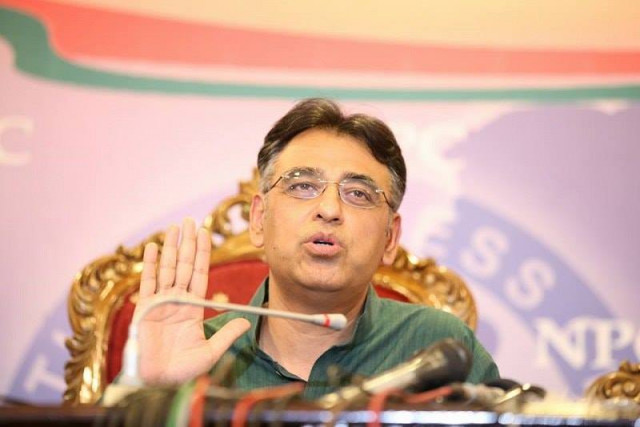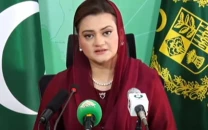Divided house: Asad Umar faces party pressure ahead of mini-budget
Finance minister says government is working to incentivise investment, discourage extravagant consumption

Finance Minster Asad Umar. PHOTO: PTI
Addressing businesspeople during his visit to the Karachi Chamber of Commerce and Industry (KCCI) on Saturday, he announced that the mini-budget will be unveiled on January 23.
Meanwhile, the new finance bill is being unveiled amidst the first serious challenge to Umar's position as the government's sole economic wizard.
According to sources, Pakistan Tehreek-e-Insaf (PTI) leader Jahangir Tareen's desire to undermine the finance minister has further complicated the economic decision-making.
Because of this, Prime Minister Imran Khan is getting conflicting advice, undermining prudent and smooth decision-making at a difficult economic juncture, the highly placed sources told The Express Tribune.
Tareen, with the help of likeminded people, tried to corner Umar during two recent meetings presided over by the prime minister, claimed the sources.
These two sessions were also attended by current and former officials of the International Monetary Fund (IMF) of Pakistani origin and close friends of Prime Minister Imran. The overall atmosphere of these meetings remained tense, according to one insider.
Masood Ahmed, former director for Central Asia and the Middle East of the IMF, Reza Baqir, who is IMF's Resident Representative in Egypt, Abraaj Group founder Arif Naqvi, and Samba Bank Chairman Shujaat Nadeem, were among the participants.
The meetings had been held with a view to review and formulate the economic policies during the PTI government's tenure, particularly the future line of action in its relations with the IMF.
Jahangir Tareen and Masood Ahmed did not respond to the queries sent by The Express Tribune.
The sources said that Tareen was not happy with the management of the economy and he wanted the government to change the course.
The sources said Tareen also wanted to get his favourites appointed at key posts in the economic affairs ministries. They said he was backing the chairman of the Federal Board of Revenue (FBR) and wanted a new governor of the State Bank of Pakistan of his choice. Tareen also had issues with Umar's subsidies policies, they said.
Pakistan faces some serious external sector challenges in the short to medium term and has engaged the IMF to seek a bailout package. The talks with the IMF have so far remained inconclusive due to harsh conditions imposed by the fund. The government has managed to get a breathing space so far by securing financial assistance commitments from Saudi Arabia, the United Arab Emirates and China.
After his disqualification by the Supreme Court, Tareen does not hold a formal office in the party but is regarded as among the most influential persons. But the sources said that it was difficult that Umar would budge.
The sources said that Masood Ahmed advised the prime minister to take a clear line of action on the IMF issue. Tareen, who apparently was earlier in favour of preparing an alternative plan instead of going to the international donor, has lately started supporting the IMF programme. The sources said Tareen had arranged two meetings of Ahmed with the prime minister.
During a meeting of the Economic Advisory Council in November last year, Tareen had backed the proposal to prepare an alternative plan, said the sources.
As a result of these meetings, Prime Minister Imran asked Umar to come up with his five-year economic plan at the earliest and showed his annoyance over a delay in taking a decisive policy line, the sources said.
But uncertainty still remains on the economic front even after these interactions, as Umar is unlikely to come under pressure as a result of events orchestrated by Tareen, said the sources.
When contacted, Iftikhar Durrani, Special Assistant to the Prime Minister on Media, said that no formal meeting took place between the prime minister, Umar, Tareen and others on the issue of the economy in the outgoing week. "If any informal meeting took place, I was not aware of it," said Durrani.
Former finance minister Dr Miftah Ismail on Saturday said the prime minister should take a clear line on the IMF programme after holding another closed-door meeting with Umar and Tareen.
The business community has also started complaining about the delay in taking certain decisions. Against this background, the finance minister visited the Karachi Chamber of Commerce and Industry.
The minister has taken a position that the government would enter into an IMF programme only when it is in the interest of the country and the government can deliver on what it agrees with the fund.
The sources said that Umar is said to have told the PM that he would make his own plan and there would not be any change in his direction. Umar is now expected to unveil the five-year 'homegrown' economic plan in the National Assembly on January 23.
Information Minister Fawad Chaudhry was not available for comment.
The finance minister also addressed businessmen at the Federation of Pakistan Chambers of Commerce and Industry (FPCCI) in Karachi.
Talking about excessive taxes and utility bills, he said the way previous governments had dealt with the economy had made things worse. He said the powers of the FBR to issue overnight statutory regulatory orders (SROs) about duties would be withdrawn and changes in taxation policy would be subject to parliamentary approval.
Sharing plans made by the government to boost investments, Umar said a Pakistan Board of Investment office was being set up in the Prime Minister Office and the meetings would be chaired by the premier.
The finance minister lamented that Pakistan's saving rate was the lowest in the world, which ultimately meant there was no money for investment. He said the government was working to change this pattern by incentivising investments and discouraging extravagant consumption.
He said people were seeing loans coming into the country, but in the next phase, they would see investments coming from abroad.
Umar lamented that the previous government had accumulated debt worth Rs2,000 billion to Rs3,000 billion on account of duty drawback of taxes, drawbacks of local taxes and levies and sales tax refunds to the private sector.
"After discussing with stakeholders, we have come to a conclusion that the government will issue one-third of the cash payment, while the rest will be paid through negotiable instruments by February 15," he added. He said the authorities were working on a policy to ensure that the central bank deals with such issues.
With additional input from our correspondent in Karachi



















COMMENTS
Comments are moderated and generally will be posted if they are on-topic and not abusive.
For more information, please see our Comments FAQ